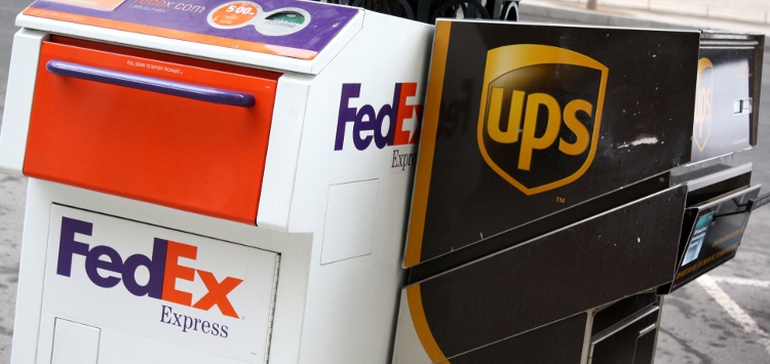 MoneyBlogNewz. (2010). “Competition in Shipping” [Photograph]. Retrieved from Flikr.
MoneyBlogNewz. (2010). “Competition in Shipping” [Photograph]. Retrieved from Flikr. UPS, FedEx suspend service guarantees citing coronavirus impact
- FedEx and UPS suspended their respective service guarantees last week, citing expected delays and disruptions related to the global coronavirus response.
- FedEx suspended its global Money-Back Guarantee as of March 24 for all FedEx Express, FedEx Ground, FedEx Freight and FedEx Office services until further notice according to an announcement on the company’s website. “The impact of COVID-19 is causing local, state, and national governments around the world to issue work and travel restrictions on a daily basis which are impacting our ability to meet our high standards of service,” reads the notice.
- UPS suspended its service guarantee indefinitely for U.S. originating shipments March 24 and all other originations March 26, according to the carrier’s website. “The Novel Coronavirus pandemic has created unprecedented complexities, which have required us to constantly reassess our operations,” reads UPS’s statement. Delivery times for some air service have also been extended.
UPS, FedEx, and other carriers are deemed “essential” services by the U.S. government, enabling them to continue operations in all states, despite social distancing mandates. But business is not proceeding as usual. UPS and FedEx alluded to the new complexities of operating in an environment with differing levels of “stay-at-home” orders in every state, as well as health threats to employees and customers.
Service adjustments speak to the more unpredictable nature of everyday supply chain transactions amid the COVID-19 response, such as making deliveries. When it comes to loading and unloading, large swings in demand related to healthcare supplies and essential consumer goods have led to bottlenecks throughout the supply chain, Convoy Director of Economic Research Aaron Terrazas told Supply Chain Dive.
These types of delays have been accumulating in the logistics ecosystem for weeks, according to Carson Krieg, co-founder of the e-commerce delivery management software platform Convey. He told Supply Chain Dive March 18 that delays at both pickup and drop-off sites have been common in recent weeks, as e-commerce companies in the categories currently surging face Black-Friday-like demand and unpredictable supply.
UPS and FedEx warn in their customer notice that shippers need to check with destination addresses to ensure they are open and avoid delivery exceptions. FedEx has suspended signature requirements in many cases (though charges for the service are still in place as FedEx drivers collect other information in lieu of a signature).
The service changes from UPS and FedEx are not as dramatic as other carriers, however, which have declared force majeure — a legal provision that stipulates the circumstance under which a provider can be relieved of liability for non-performance of a contract. Ceva Logistics and DHL Global Forwarding have done so within the last 10 days.
FedEx and UPS have not taken this step, but iDrive Logistics President Glenn Gooding told Supply Chain Dive not to count out the possibility. He also said to expect the carriers to reassess these service guarantees going forward, even after COVID-19 is not the most pressing issue of the day.
“I truly believe they’re going to experiment with not reinstating it at any given time. It’s real revenue to them. It’s been an issue and a pain point for them … And they’re always looking for a way to impose a different billing methodology or improve their revenue position,” Gooding said of the carriers.
When asked whether it is considering a force majeure declaration and if the service guarantee will return after the COVID-19 crisis resolves, a UPS spokesperson sent Supply Chain Dive the following statement via email: “This is an unprecedented situation and UPS declines to speculate about future policies.”
A FedEx spokesperson emailed the following response to the same questions: “This [Money Back Guarantee] suspension will be in effect until further notice, and we will evaluate status on an ongoing basis. The regulatory environment is shifting rapidly as a result of the coronavirus.”









